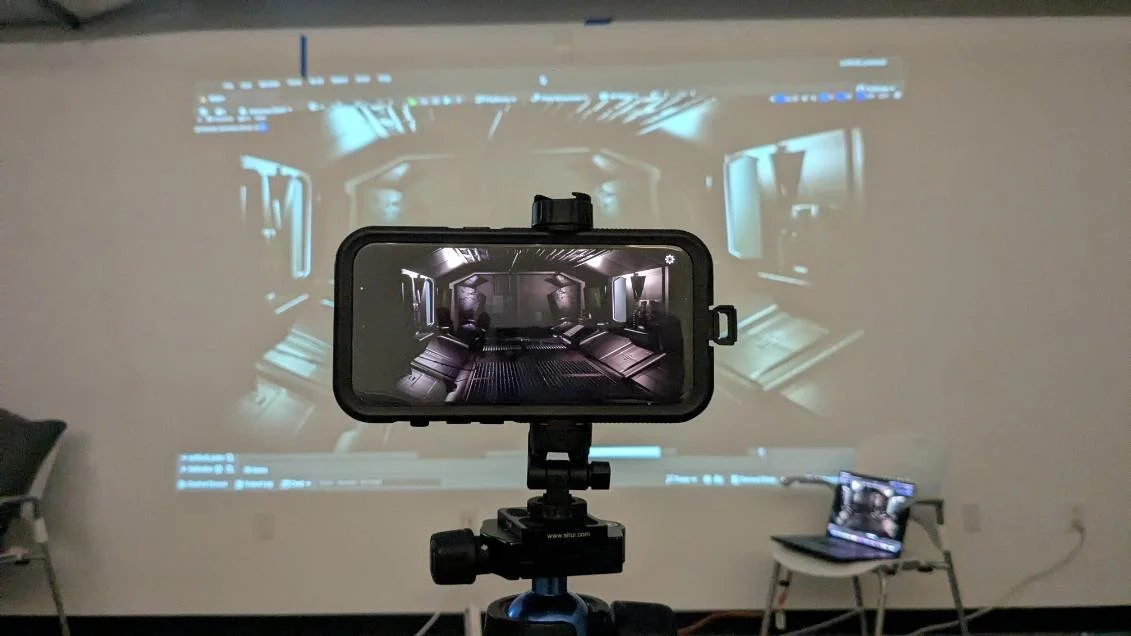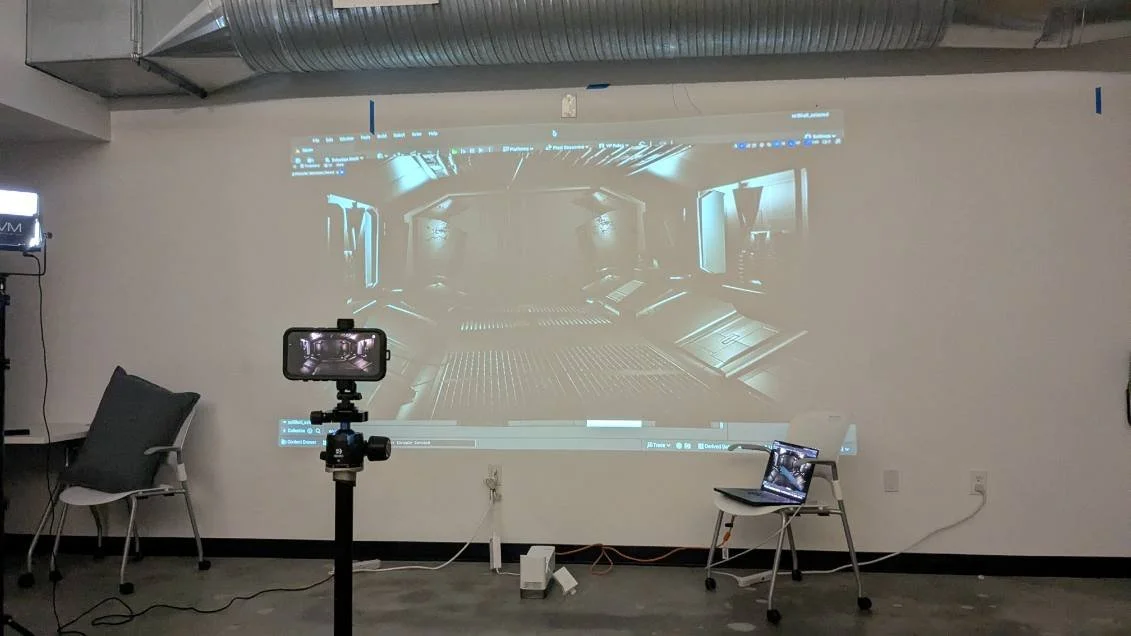
Small-Scale Virtual Production
‘Turned Around’
THE CONCEPT:
‘Turned Around’ explores creating a virtual production set in a small scale application using real-time 3D projection. This project emulates current virtual production techniques by configuring an Unreal Engine scene with remote controllable projections. This allows for the optical illusion movement of a virtual camera without the budget required of a traditional volume stage, like those used for The Mandalorian or Avatar: The Way of Water.
To show the application of this alternative production method, several “example shots” were strung together for a micro film. This short storyline shows the subject getting “turned around” when finding themself in a new environment and in strange company.
RESEARCH:
EXAMPLES:
Large Production Applications:
(The Mandalorian, Game of Thrones, Dune Part II) Using volume stages and full set LED screens
Small Scale Applications:
Projections and small LED screens (such as tvs) - incorporating traditional special effects with digital assets
jsjks
PROJECT RESOURCES:
Epic Games - Unreal Engine Virtual Camera Actor Tutorial
Detailed explanation and step-by-step documentation of the “virtual camera actor” and “live link connection”
DevEdge Studio - Mobile Virtual Camera Control Tutorial
Live link -to- mobile control instructions (was used for troubleshooting manual IP connection problems)
Max Rovensky - Example Scene and Set-up Walkthrough
Reference for example application and beginning introduction to the production set up
Film Riot - Projector Set-up and Documentation of Example Application
Direct reference for projector parameters and resources (was also used as example reference for cinematography)
TEST 1 (3/5/25)
TEST 2 (3/13/25)
INSIGHTS:
First test with LED (TV) Screen - Provided better color saturation than low lumen projector (Color still untrue to model), vastly limited proportions of cinema shots, caught shadows from external scene lighting
Virtual Camera control updated - Better control in the modulated virtual scene, still unsteady due to high sensitivity, VCam Actor in Unreal became off kilter from mobile controller
(Puppet used in place of actor for this test - therefore actor action tests are calibrated for puppet movement)
TROUBLESHOOTING:
TECH:
VCam sensitivity settings were adjusted to prevent unintended camera shake.
“In scene” lights were adjusted to further match exterior light temperatures
EQUIPMENT:
I changed to the LG CineBeam available on campus for further tests. Unfortunately, this projector only has a 1500 lumen count, which is lower than ideal.
(The suggested Lumen count is 4000+, therefore I began sourcing another projector)
TEST 3 (4/2/25)
INSIGHTS:
Better projection output with more controlled lighting in the “set” room.
The Ultra Short Throw projector’s throw ratio created a better projection to camera illusion
Changing the sensitivity settings and adding a mechanized turning patform allows for potential 180 degree panning shots.
Zoom call with professional cinematographer: Received advice on scene lighting and programming
UP NEXT:
Sourcing a higher lumen projector, setting up optimized lighting, testing final “story” shots
FINAL TEST
FINAL TEST
‘Turned Around’
Final compilation of shots for proof of technical concept.

The Process:
Setting up the scene with a larger, brighter projector went smoothly. Adjustments to the stabilization settings were made one more time.
Sadly, the lighting set up used turned out to be insufficient, but troubleshooting was done on sight.
Most stationary shots were achieved easily. The one 180 shot involved a lot of trial and error, but resulted in a better method for future projects.
Insights & Solutions:
LARGER SPACE: this room was quite small, a larger shooting space would allow for more distance from the projection - thus allowing for better lighting and depth of field
ADVANCED LIGHTING: many problems became apparent due to light washing out the projection and technical issues - better control over the lighting would improve quality and believability
HIGHER QUALITY CAMERA: The camera used here was chosen exclusively because of availability - for future endeavors, a video specific camera would function at a higher quality
CONTROLLER CAMERA MOUNT: Many problems with the VCam sensitivity or movement control came from the inability to keep the controller stable to the physical camera - a camera specific mount would eliminate the issues of hand modifying the controller to keep the projection in sync





